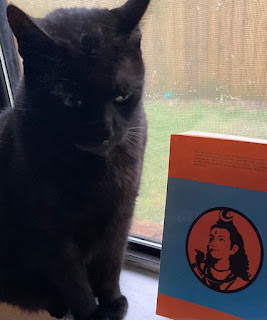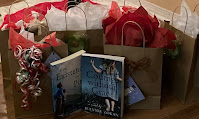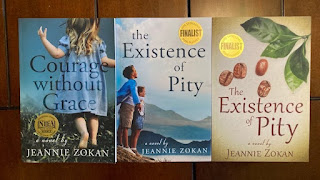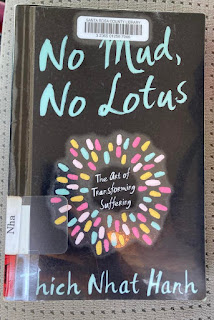Sri Sathya Sai Baba was a controversial Indian guru, and I dove into Sai Baba: The Holy Man and the Psychiatrist knowing about that. I recently found this book at Open Books & Prison Book Project, and it reminded me of a friend from thirty-five years ago. She was a Sai Baba devotee who traveled to India to see him. She had photos of him everywhere and spoke lovingly of him, and I wanted what she had, but something held me back from becoming a Sai Baba devotee. Like her, I wanted to be in love with my spiritual practice so much that nothing else mattered - and I still do. But I had to find my own path.
I appreciate the author, an American psychiatrist named Samuel H. Sandweiss, who tells of his travels to India to see Sai Baba, and describes his very human experience of devotion with openness and candor.
How true that, "Even though at present we know little about the various factors and mechanisms involved in a spiritual transformation, it is almost enough to be aware that such a phenomenon exists at all. Knowing that many people have undergone or been witness to this extraordinary experience can bring joy, and the strength to continue."
"Engaging our mind constantly with God will tame it and bring it under control. When I was able to detach the mind from my struggle, and it became stilled and centered in the task of just being aware of my breathing, I felt great calm and relief." This is the benefit meditation offers me. I have learned to lay down the questions and fears, step back, and breathe. The reprieve may last moments or hours, and sometimes it transforms into peace, even joy.
This revelation from Sandweiss seems to be what the devotee experience is all about. "There is so much love in the world! Never had I felt this exquisite experience so deeply. Baba showed me in an instant what years of psychiatry had not: the means for igniting this love. Such deep love is born from the devotional yearning for, the sometimes suffering journey toward, the divine."
Sandweiss doesn't sugarcoat the difficulties of visiting India. But, "Despite the discomfort, most found Prasanthi Nilayam (the main ashram of Sai Baba) a special place with strong spiritual vibrations. Statues of gods, pictures of Baba, and the constant cleaning of sacred areas around the temple contribute to an atmosphere of silence charged with holiness."
This charged atmosphere fuels many of us who seek out holy places like Sedona in Arizona, India, and beautiful churches all over the world. In The Existence of Pity, I write about La Ermita, the Colombian church Josie visits with Blanca. Josie also finds solace in Washington DC's National Cathedral in Courage Without Grace.
This may be why so many are seekers: Sai Baba says, "Do not tell me that you do not care for that bliss, that you are satisfied with the delusion and are not willing to undergo the rigors of sleeplessness. Your basic nature, believe me, abhors this dull, dreary routine of eating, drinking and sleeping. It seeks something which it knows it has lost - santhi, inward contentment. It seeks liberation from bondage to the trivial and the temporary. Everyone craves for it in his heart of hearts. And it is available only in one shop: contemplation of the Highest Self, the basis of all this appearance."
But how to find santhi on a day-to-day basis? Sai Baba says, "Keep the name of the Lord always on your lips and you will find that all thoughts of envy and hatred will disappear from you hearts. Let every moment be a bhajan (a devotional song). Avoid all lesser talk. Know the purpose of bhajan and devote yourself wholeheartedly to it."
Sandweiss explains, "Baba directs people to keep conscious contact with whatever experience they have of God and to meditate on that experience as much as they can. One may engage in the meditation formally, sitting quietly by oneself and trying to make contact with the light within... or one may practice constant repetition of one of the names of God so that God is on the tongue at all times. And Baba also teaches that one should relate to every life situation as if it is God, with the same sense of responsibility, devotion and love. Thus our daily activity will become a devotional service and our life an act of worship."
"
Bhakthi or devotion is the only path for reaching the divine destination.
Bhakthi is the only panacea for all the ill of this world.
Bhakthi is the only method of making you realize the truth."
If one is not singing bhajans, Sai Baba recommends something that does not come naturally to me: "Practice silence. For the voice of God can be heard in the region of the heart only when the tongue is still... Silence is the speech of the spiritual seeker. Soft sweet speech is the expression of genuine love." I remember my friend from long ago was a quiet soul. Since she was not the kind to join social media I have been unable to find her, but maybe our paths will cross again. Sai Baba died in 2011, but he still has many followers, and I wonder if my friend is one of them. I glean wisdom from his words, but continue on my own path, seeking my truth.
 This last quote reminds me of another favorite aspect of the book; the relationship between the Pope and the Dalai Lama. First and foremost, they are kind to each other, respecting the other's belief system. Laughter and delight seem to be their most proficient common language.
This last quote reminds me of another favorite aspect of the book; the relationship between the Pope and the Dalai Lama. First and foremost, they are kind to each other, respecting the other's belief system. Laughter and delight seem to be their most proficient common language.




















